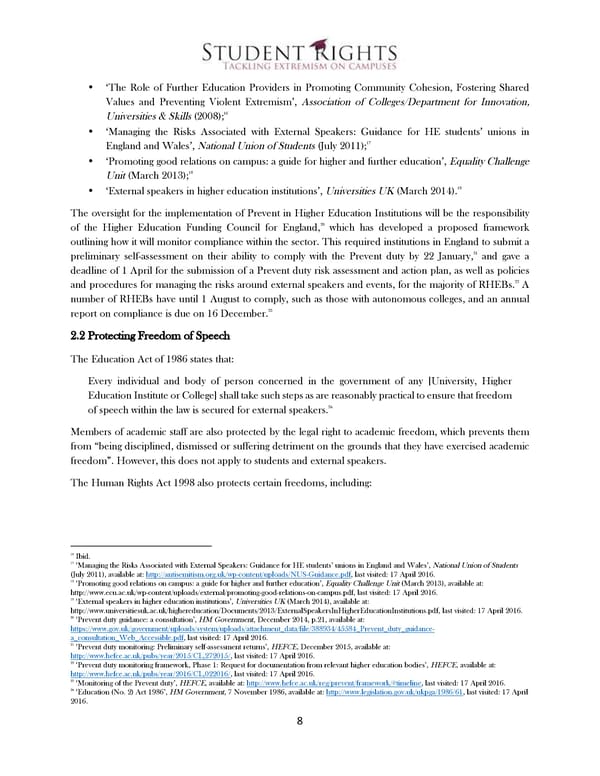! •! ‘The Role of Further Education Providers in Promoting Community Cohesion, Fostering Shared Values and Preventing Violent Extremism’, Association of Colleges/Department for Innovation, 16 Universities & Skills (2008); •! ‘Managing the Risks Associated with External Speakers: Guidance for HE students’ unions in 17 England and Wales’, National Union of Students (July 2011); •! ‘Promoting good relations on campus: a guide for higher and further education’, Equality Challenge 18 Unit (March 2013); 19 •! ‘External speakers in higher education institutions’, Universities UK (March 2014). The oversight for the implementation of Prevent in Higher Education Institutions will be the responsibility 20 of the Higher Education Funding Council for England, which has developed a proposed framework outlining how it will monitor compliance within the sector. This required institutions in England to submit a 21 preliminary self-assessment on their ability to comply with the Prevent duty by 22 January, and gave a deadline of 1 April for the submission of a Prevent duty risk assessment and action plan, as well as policies 22 and procedures for managing the risks around external speakers and events, for the majority of RHEBs. A number of RHEBs have until 1 August to comply, such as those with autonomous colleges, and an annual 23 report on compliance is due on 16 December. ! 2.2 Protecting Freedom of Speech The Education Act of 1986 states that: Every individual and body of person concerned in the government of any [University, Higher Education Institute or College] shall take such steps as are reasonably practical to ensure that freedom 24 of speech within the law is secured for external speakers. Members of academic staff are also protected by the legal right to academic freedom, which prevents them from “being disciplined, dismissed or suffering detriment on the grounds that they have exercised academic freedom”. However, this does not apply to students and external speakers. The Human Rights Act 1998 also protects certain freedoms, including: !!!!!!!!!!!!!!!!!!!!!!!!!!!!!!!!!!!!!!!!!!!!!!!!!!!!!!!!!!!!! 16 Ibid. 17 ‘Managing the Risks Associated with External Speakers: Guidance for HE students’ unions in England and Wales’, National Union of Students (July 2011), available at: http://antisemitism.org.uk/wp-content/uploads/NUS-Guidance.pdf, last visited: 17 April 2016. 18 ‘Promoting good relations on campus: a guide for higher and further education’, Equality Challenge Unit (March 2013), available at: http://www.ecu.ac.uk/wp-content/uploads/external/promoting-good-relations-on-campus.pdf, last visited: 17 April 2016. 19 ‘External speakers in higher education institutions’, Universities UK (March 2014), available at: http://www.universitiesuk.ac.uk/highereducation/Documents/2013/ExternalSpeakersInHigherEducationInstitutions.pdf, last visited: 17 April 2016. 20 ‘Prevent duty guidance: a consultation’, HM Government, December 2014, p.21, available at: https://www.gov.uk/government/uploads/system/uploads/attachment_data/file/388934/45584_Prevent_duty_guidance- a_consultation_Web_Accessible.pdf, last visited: 17 April 2016. 21 ‘Prevent duty monitoring: Preliminary self-assessment returns’, HEFCE, December 2015, available at: http://www.hefce.ac.uk/pubs/year/2015/CL,272015/, last visited: 17 April 2016. 22 ‘Prevent duty monitoring framework, Phase 1: Request for documentation from relevant higher education bodies’, HEFCE, available at: http://www.hefce.ac.uk/pubs/year/2016/CL,022016/, last visited: 17 April 2016. 23 ‘Monitoring of the Prevent duty’, HEFCE, available at: http://www.hefce.ac.uk/reg/prevent/framework/#timeline, last visited: 17 April 2016. 24 ‘Education (No. 2) Act 1986’, HM Government, 7 November 1986, available at: http://www.legislation.gov.uk/ukpga/1986/61, last visited: 17 April 2016. 8! !
 A Model External Speaker Policy Page 9 Page 11
A Model External Speaker Policy Page 9 Page 11